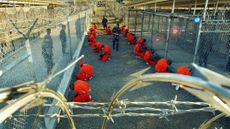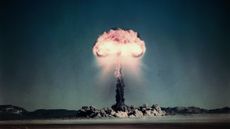Secret weapon behind Chuck Hagel’s plan to shrink US army
It’s oil. Self-sufficient in energy because of shale oil, the US no longer needs to fret about the sheiks

IN 410 AD the Emperor Honorius withdrew the last remaining legions from Britain and told us we would have to look to our own resources for defence. With the deep cuts in the size of the US military announced at the Pentagon yesterday by Secretary of Defence Chuck Hagel, it looks as though the United States is beginning the same process.
The biggest losers in Hagel’s plan will be the US Army, shrinking in the next five years from 520,000 to around 440,000. Significantly, the army will not procure a new armoured personnel carrier (APC).
An updated, up-armoured, wheeled or tracked APC, able to offer protection against the latest and most sophisticated mines and bombs, would be high on the shopping list if US planners were envisaging a repeat of the long-term occupation of places like Iraq.
Subscribe to The Week
Escape your echo chamber. Get the facts behind the news, plus analysis from multiple perspectives.

Sign up for The Week's Free Newsletters
From our morning news briefing to a weekly Good News Newsletter, get the best of The Week delivered directly to your inbox.
From our morning news briefing to a weekly Good News Newsletter, get the best of The Week delivered directly to your inbox.
The US Air Force will also mothball its A10 ‘Thunderbolt’ - a slow but formidable aircraft, specifically designed for Close Air Support, and beloved of GIs in Iraq and Afghanistan for its ability to bail them out of trouble.
The plan represents a revolution in military affairs. In effect, the United States is conceding that its attempts to occupy Iraq and Afghanistan have failed, and that it is no longer seriously planning anything similar in the future.
Eminently sensible to many, this view is likely to receive a rough ride in Congress. A lingering attachment to the American imperium, and the pork-barrel politics of which bases are to be closed in which state, or congressional district, will ensure a powerful opposition.
Equally, Chuck Hagel is likely to prove a formidable manager of the political processes required to get his way. A three-term senator from Nebraska, he volunteered for Vietnam in 1968, fighting there as an infantry sergeant in the Mekong Delta. He has two Purple Hearts.
It is also an ideological victory for the ‘Bidenistas’, the military thinkers sympathetic to the views of Vice-President Joseph Biden, who in 2010 argued strongly against the so-called ‘surge’ of 33,000 extra troops for Afghanistan.
The Bidenistas have always preferred stand-off operations – drones, raids, special forces - to large numbers of ‘boots on the ground’. Even as the army gets smaller, Special Operations Command will expand by 3,700.
Biden and his allies lost the argument to hawks like Hilary Clinton, and Hagel’s predecessor, Robert Gates (who, incidentally, is gushingly enthusiastic about Mrs Clinton in his recently published autobiography Duty: Memoirs of a Secretary at War, and icily dismissive of Biden). But if Biden was right all along, it could strengthen his hand for a presidential run. Certainly his strategic judgment is now in fashion.
On the naval side, all 11 carrier groups will be retained under Hagel’s proposals and will continue to be crucial to the projection of American military power. The two most important pieces of paper POTUS (the President of the United States) receives at eight o’clock sharp each morning are an intelligence summary known as the Presidential Daily Briefing and a map of the world showing the location and readiness of the carriers.
Hagel’s plan has a long way to go yet. But lingering behind it is a new strategic reality partly based on an acceptance of failure – however noble the intentions, and despite the bravery and endurance of American soldiers in the field – and partly on a startling fact soon to be upon us: American self-sufficiency in energy.
In November 2013, thanks to the shale oil boom, US monthly domestic oil production exceeded imports for the first time in 20 years. Within ten years or so, America will not be shipping any oil from the Middle East.
The full implications of this are hard to discern at this stage. The security of the state of Israel is likely to remain a high priority, whoever sits in the Oval Office. But the days of American presidents fretting in the Situation Room late at night over the ultimate fate of the Saudi royal family or the Gulf sheikdoms are drawing rapidly to a close.
Create an account with the same email registered to your subscription to unlock access.
Sign up for Today's Best Articles in your inbox
A free daily email with the biggest news stories of the day – and the best features from TheWeek.com
-
 Nigeria's worsening rate of maternal mortality
Nigeria's worsening rate of maternal mortalityUnder the radar Economic crisis is making hospitals unaffordable, with women increasingly not receiving the care they need
By Harriet Marsden, The Week UK Published
-
 'Elevating Earth Day into a national holiday is not radical — it's practical'
'Elevating Earth Day into a national holiday is not radical — it's practical'Instant Opinion Opinion, comment and editorials of the day
By Harold Maass, The Week US Published
-
 UAW scores historic win in South at VW plant
UAW scores historic win in South at VW plantSpeed Read Volkswagen workers in Tennessee have voted to join the United Auto Workers union
By Peter Weber, The Week US Published
-
 Will Iran's attack on Israel backfire?
Will Iran's attack on Israel backfire?Today's Big Question The unprecedented targeting of Israel could be a 'godsend' for Netanyahu as the limits of Tehran's military power are exposed
By Elliott Goat, The Week UK Published
-
 Will Iran risk all-out war with Israel?
Will Iran risk all-out war with Israel?Today's Big Question Tehran has not wanted to be directly involved in the Middle East conflict so far. But that could be about to change
By Chas Newkey-Burden, The Week UK Published
-
 A history of Guantánamo Bay
A history of Guantánamo BayThe Explainer War of Terror's 'symbol of torture, rendition and indefinite detention' is subject of new Serial podcast series
By The Week UK Published
-
 'Humanitarian islands': how will Israel's plan for Rafah civilians work?
'Humanitarian islands': how will Israel's plan for Rafah civilians work?Today's Big Question Designated zones in central Gaza to provide temporary housing, food and water for more than a million displaced Palestinians
By The Week UK Published
-
 How likely is an accidental nuclear incident?
How likely is an accidental nuclear incident?The Explainer Artificial intelligence, secret enemy tests or false alarms could trigger inadvertent launch or detonation
By Chas Newkey-Burden, The Week UK Published
-
 Pentagon struggles to explain Defense Secretary Lloyd Austin's secret hospitalization
Pentagon struggles to explain Defense Secretary Lloyd Austin's secret hospitalizationSpeed Read The intensely private Pentagon chief kept even President Joe Biden in the dark about his illness for 3 days
By Peter Weber, The Week US Published
-
 Israel-Hamas: what do both sides need in order to agree a sustainable ceasefire?
Israel-Hamas: what do both sides need in order to agree a sustainable ceasefire?Today's Big Question Israel and Hamas 'open' to renewed ceasefire and hostage release, as pressure mounts on Benjamin Netanyahu at home and abroad
By Elliott Goat, The Week UK Published
-
 Will Israeli invasion of Gaza backfire?
Will Israeli invasion of Gaza backfire?Today's big question The reality is that there are no good options for Benjamin Netanyahu
By The Week Staff Published